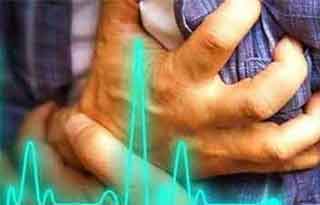- Home
- Editorial
- News
- Practice Guidelines
- Anesthesiology Guidelines
- Cancer Guidelines
- Cardiac Sciences Guidelines
- Critical Care Guidelines
- Dentistry Guidelines
- Dermatology Guidelines
- Diabetes and Endo Guidelines
- Diagnostics Guidelines
- ENT Guidelines
- Featured Practice Guidelines
- Gastroenterology Guidelines
- Geriatrics Guidelines
- Medicine Guidelines
- Nephrology Guidelines
- Neurosciences Guidelines
- Obs and Gynae Guidelines
- Ophthalmology Guidelines
- Orthopaedics Guidelines
- Paediatrics Guidelines
- Psychiatry Guidelines
- Pulmonology Guidelines
- Radiology Guidelines
- Surgery Guidelines
- Urology Guidelines
High thyroid hormone levels may up atrial fibrillation risk

Individuals with higher levels of thyroid hormone (free thyroxine, FT4) circulating in the blood were more likely than individuals with lower levels to develop the irregular heartbeat, or atrial fibrillation, even when the levels were within normal range, according to new research in the American Heart Association's journal Circulation.
"Our findings suggest that levels of the thyroid hormone, free thyroxine, circulating in the blood might be an additional risk factor for atrial fibrillation," said study lead author Christine Baumgartner, M.D., specialist in General Internal Medicine from the University Hospital of Bern, Switzerland, and currently a postdoctoral scholar at University of California San Francisco. "Free thyroxine hormone levels might help to identify individuals at higher risk."
In the United States, irregular heartbeat (atrial fibrillation) affects between 2.7 to 6.1 million people and is estimated to affect up to 12.1 million people by 2030. It occurs when the two upper chambers of the heart, called the atria, beat irregularly and faster than normal. Symptoms may include heart palpitations, dizziness, sweating, chest pain, anxiety, fatigue during exertion and fainting, but sometimes patients with atrial fibrillation have no symptoms at all. Although people can live with irregular heartbeat, it can cause chronic fatigue and increase the risk of serious illnesses, such as stroke and heart failure, potentially associated with lifelong disability and even death. Fortunately, medication and other therapies are available to treat irregular heartbeat and reduce the risk of the associated symptoms and complications.
The thyroid gland is a small gland in the neck. In response to thyroid-stimulating hormone released by the pituitary gland, the thyroid gland secretes thyroid hormones required to regulate energy metabolism. Patients with low levels of thyroid hormone, or hypothyroidism, may require medications containing thyroid hormone (thyroxine) to increase their hormonal levels. Sometimes intake of thyroxine sometimes can increase these levels too much.
Previous studies showed that the risk of irregular heartbeat is greater among individuals who produce too much thyroid hormone than among those with normal hormonal levels. What was unclear, however, was whether levels that were high but still within the normal range could also increase the risk of irregular heartbeat.
To understand this relationship, investigators looked at the occurrence of irregular heartbeat among individuals with thyroid hormone levels that were still within normal range. They found that individuals with higher blood levels of FT4 within the normal range at the beginning of the study were significantly more likely than those with lower levels to subsequently develop irregular heartbeat.
When separated into four equal-sized groups, the group with the highest FT4 levels had a 45 percent increased risk of irregular heartbeat, compared to the group with the lowest levels. Even more modest increases in thyroid hormone were associated with an increased risk. Among individuals with the second highest levels, the risk was 17 percent greater, and among those with the third highest levels the risk was 25 percent greater, compared to those with the lowest levels. High levels of thyroid-stimulating hormone (TSH) within the normal range, however, were not associated with an increased risk of atrial fibrillation.
"Patients who are treated with thyroxine, one of the most frequently prescribed drugs in the United States, generally have higher circulating free thyroxine levels compared to untreated individuals," Baumgartner said. "So, an important next step is to see whether our results also apply to these patients, in order to assess whether target free thyroxine thyroid hormone concentrations for thyroid-replacement therapy need to be modified."
The investigators analyzed data from 11 studies from Europe, Australia, and the United States that measured thyroid function and the occurrence of irregular heartbeat. Overall, the studies included 30,085 individuals. Their average age was 69 years, and slightly more than half were women. On average, follow-up ranged from 1.3 to 17 years. The investigators obtained the studies by searching the MEDLINE and EMBASE medical databases through July 2016.
For more details click on the following link: http://dx.doi.org/10.1161/CIRCULATIONAHA.117.028753

Disclaimer: This site is primarily intended for healthcare professionals. Any content/information on this website does not replace the advice of medical and/or health professionals and should not be construed as medical/diagnostic advice/endorsement or prescription. Use of this site is subject to our terms of use, privacy policy, advertisement policy. © 2020 Minerva Medical Treatment Pvt Ltd